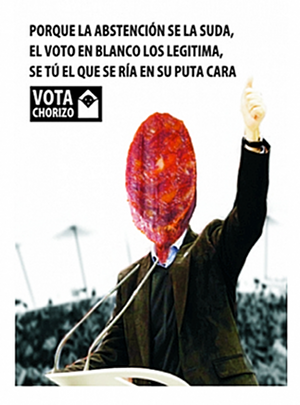
With just a couple of weeks left before the November 20 general elections in Spain, the May 15 movement has become a major player. Large political parties are either trying to woo the movement to win votes or to define themselves against it in some fashion. Either way, they can’t ignore it. As another nationwide, occupation- and assembly-based movement, the experience of May 15 might be an indication of the role that the occupations taking place around the United States now will affect the balance of power in the 2012 election cycle.
For Spain’s right-wing Partido Popular (PP), the main opposition party and the projected winner in the polls, the May 15 movement has grown from the “nightmare” of its rivals into a rival in its own right. Last May, the PP candidate Mariano Rajoy addressed the Indignados, calling on them to be the solution of the problem. “The alternative to what we have is very clear: it’s to become a political force ourselves,” he said, just before the municipal and regional elections. PP scored a major victory then, but it wasn’t because of the votes of May 15 supporters. #Nolesvotes (#Don’tvoteforthem) and Democracia Real Ya (Real Democracy Now) campaigned against the PP and the PSOE (Spanish Socialist Workers’ Party, the center-left ruling party), resulting in an increase of blank and null votes cast as a form of protest. These amounted to 4.23% of all votes, making it the fourth-largest voting bloc, but of course these empty votes achieved no representation in the government.
Now, facing the general elections, the PP’s platform touches on some of the May 15 movement’s concerns—such as the mortgage law (which they promise to reform slightly) and political corruption (which they promise to fight, even though some of their candidates are charged with just this). However, the party’s attitude towards the movement has changed. A PP campaign video, for example, says the following over scenes of people protesting:
Some of them want to fight, some want confrontation… Some of them do it to create stress, but this country doesn’t need fights, it needs solutions… It’s not the time to fight, it’s the moment to join forces to get Spain out of the most difficult economic situation in its history. For all the people who knows that concord is better than confrontation, consensus better than discord, clarity better than confusion.
People in the movement quickly replied with their own video, which shows very different images over the same narration:
The PSOE continues to see the May 15 movement as a potential ally in the voting booth. For months, Alfredo Pérez Rubalcaba, the PSOE candidate, has winked at the movement, and his courtship has increased since the beginning of the campaign.
The PSOE’s platform explains, “The economic crisis has caused the perception that our democracy is no longer effective, that politics has not been able to control the markets.” It continues, “Citizens demand new efforts to improve our democratic system. In recent months we have heard on the streets calls for a more open state and a more transparent, participative and inclusive politics.” Now, after months of protest, the party’s platform includes some of the concerns of movement, including the “dación en pago” (mortgage cancellation, which PSOE voted against last June), the Tobin tax (a small tax on foreign currency exchange transactions, which they rejected in February of 2010), and an electoral law reform to avoid the dominance of two parties (which they rejected in March of 2010).
The different organizations associated with the May 15 movement have discussed at length whether or not to work through a political party to change things “from the inside.” Their decision was clear: May 15 is a non-partisan movement. Some hoped to take advantage of its popularity by creating a Party of the May 15 Citizen Movement, which tried to enter the elections without the agreement of the movement itself, and which was finally expelled from the process.
Izquierda Unida (IU—United Left), the third-largest political force in Spain, has also tried to present itself as the party of the May 15 movement, although more discreetly. IU has included on its list of nominees some people with ties to the movement, and it has many priorities in common. The Tobin tax, the removal of the tax benefits for elected representatives, the reduction of the workday as a solution of the unemployment problem, and the electoral law reform are some of the movement’s objectives that are in the IU platform.
But May 15 is finding its own way of taking an active part in the elections. Democracia Real Ya, Anonymous, #Nolesvotes and various assemblies have started an informational campaign to demand responsible and thoughtful voting in the legislature, denounce the role of PP and PSOE in the current economic situation, and oppose the power of the banks on politics. They don’t recommend that people vote for any party in particular, but the message is clear: give your vote to minor parties or give a null vote.
Meanwhile, some assemblies have called for the removal of the Senate, which they consider useless, encouraging people to cast a null vote or vote for the Escaños en Blanco (White Seats), a party whose candidates agree to not use their seats and to refuse any salary, with the goal of emptying the Senate.
Although polls say that the PP will win the next elections, they also show the erosion of the dominance of the two major parties in Spain as a result of the citizen mobilizations. With the May 15 movement’s impact just starting to take shape in electoral politics, there may be more surprises in store.
